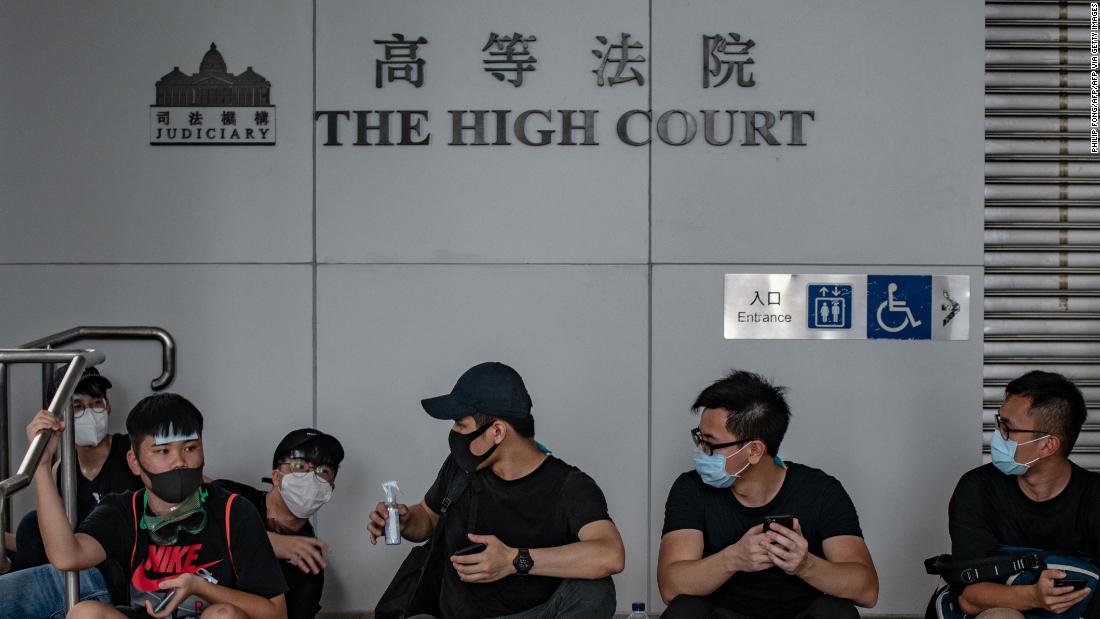
But the ruling has provoked anger in China, with the country's top legislature signaling that it may use this as an opportunity to drastically rewrite Hong Kong's legal framework.
The original ban was introduced by the city's embattled leader, Carrie Lam, using colonial-era emergency powers in the case of "public danger or emergency."
On Monday, the court said that these powers, at least in the case of "public danger," were unconstitutional and had been superseded by the city's de facto constitution, the Basic Law.
That constitution was adopted following Hong Kong's handover from Britain to China in 1997, and grants citizens in the semi-autonomous Chinese city freedoms that are unheard of on the mainland.
Following the court's decision, the Hong Kong government said the controversial ban would no longer be enforced while it considered appealing. However, according to China's top legislature, Hong Kong courts have no power to rule on the constitutionality of legislation under the city's Basic Law.
"The constitution and the Basic Law together form the constitutional basis of the special administrative region," a spokesman for the National People's Congress, China's rubber-stamp parliament, said Tuesday. "Whether a law ... is in conformity with the Basic Law ... can only be judged and decided by the NPC Standing Committee, and no other organ has the right to judge or decide."
Were this rhetoric to be put into action, it could effectively end the right to judicial review in Hong Kong, a bedrock of the city's rule of law. It's also just the type of overreach from Beijing that has brought people out onto the streets for months.
While the NPC does have the constitutional right to "interpret" the Basic Law as a de facto supreme court, and has done several times in the past to great controversy, the assertion that lower courts cannot rule on constitutional matters is totally out of keeping with both the basic tenets of common law and Hong Kong jurisprudence.
'End of the rule of law'
The pronouncement, which was echoed in aggressive editorials in state media, was greeted with shock by legal observers in the city.
"If this is a formal/official position, then this completely and fundamentally alters the landscape of the Hong Kong legal system and could quite legitimately be said to mean the end of the rule of law as we know it in Hong Kong," said Antony Dapiran, a Hong Kong-based lawyer and author of "City of Protest."
"More specifically: it would mean the death of 'separation of powers' in Hong Kong, a doctrine fundamental to the common law rule of law -- and one Beijing comprehensively rejects. A fundamental principle of rule of law is that everyone, including the legislature and executive, is subject to law. Government's lawmaking must be lawful (consistent with constitution/Basic Law). The courts through an independent judiciary 'police' that."
Hong Kong courts have ruled in the past on constitutional matters without criticism from the Chinese government. In 2017, the city's Court of Final Appeal found the Hong Kong government's refusal to grant a partner visa to the wife of a British expat was unconstitutional, even though the city does not recognize same-sex marriage.
"The exercise of judicial power means the power to give binding and enforceable adjudications on legal disputes," Chief Justice Geoffrey Ma said after that case. "In the public law sphere, the power exists in the courts even to strike down legislation or executive acts if they are shown to have been made in violation of constitutional principles."
In other common law systems, courts also regularly strike down legislation which falls outside of constitutional limits or contradicts binding human rights treaties such as the European Convention on Human Rights.
The tension between the right of judicial review and the Chinese system -- which is often described as "rule by law" and frees the Communist Party to rewrite legislation as it sees fit and order courts to enforce it -- has been a long-running one in Hong Kong since 1997.
Most notably, after several newly-elected radical lawmakers attempted to stage protests during their oath taking ceremonies in 2016, the NPC bypassed the courts, issuing an "interpretation" of the Basic Law which held that "reading the vows in any dishonest, ungraceful manner is also a refusal to the oath, and it shall be void."
That move was criticized by many in Hong Kong, who felt the situation could have been dealt with by the city's courts, and the intervention by China's parliament risked undermining confidence in the rule of law.
Hong Kong's government regularly points to the importance of the rule of law as something which sets the territory apart from China and helps foreign businesses and investors feel confident pumping money into the city. It has often criticized those who complain about prosecutions or judicial decisions for "undermining the rule of law."
Any undermining in this manner would pale in comparison to the potential ramifications of a decision along the lines of the NPC's statement this week however, which would essentially strip Hong Kong's courts of much of their power and bring them more firmly in line with China's less-than-fair system.
Given that the High Court ruled against the mask ban on the grounds that it was a disproportionate impact on citizens' rights, it could also free up the government to pursue more draconian measures in theory protected by the city's constitution. Something that may be attractive to those in Hong Kong and Beijing who are wringing their hands over how to stop the ongoing unrest.
World - Latest - Google News
November 19, 2019 at 02:02PM
https://ift.tt/2KAcsom
China just hinted it may upend Hong Kong's legal system over the mask ban - CNN
World - Latest - Google News
https://ift.tt/2SeTG7d
Shoes Man Tutorial
Pos News Update
Meme Update
Korean Entertainment News
Japan News Update
No comments:
Post a Comment